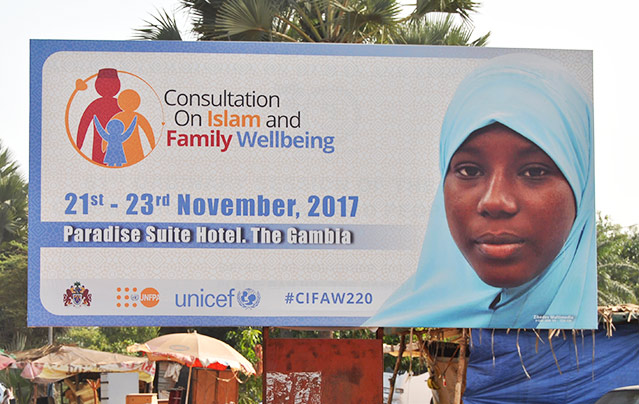March 16, 2018
“Be fruitful and multiply”
Hundreds of religious texts serve as a backdrop in the office of Moroccan ultra-Orthodox rabbi Daniel Bitton, at the Hamaor Institute in Jerusalem, Israel. Steam rises from a coffeemaker and the interview begins. He starts at the beginning, which is his position on family planning: “I can’t explain something that doesn’t exist. There is no such thing as family planning for us. We don’t decide anything. God plans everything and decides everything.”
From denial to prohibition, the rabbi is not alone in his position. The three main monotheistic religions have the same starting point: sex is only permitted within marriage and its ultimate goal is reproduction. That leaves little room for contraceptives. Promoting their use might encourage promiscuity and sin.
Many things have changed in these religions, among their clergy and especially among believers. Not all of them interpret religious texts in the same way, nor do they follow their leader’s rules to the letter. But religion continues to be a barrier to birth control. Sometimes it is so intertwined in people’s values that it’s almost invisible.
Pope Francis criticises the concept of ‘safe sex’, saying, “As if an eventual child were an enemy to be protected against.”
Pope Paul VI wrote in the Encyclical Humanae Vitae, that contraceptive use leads to selfish enjoyment, disrespect and abuse of women. Sterilisation or anything that interferes with procreation is prohibited, too. Pope Francis, in his Amoris Laetitia, took a step toward removing the aura of sin on sex between spouses, at least. But in the same text he criticises “coercive” government family planning campaigns for having a dangerous “anti-birth mentality.” He also attacks the concept of safe sex, writing, “such expressions convey a negative attitude towards the natural procreative finality of sexuality, as if an eventual child were an enemy to be protected against”.
Some 5,600 kilometres from Jerusalem and 4,140 km from The Vatican, in Thiès, Senegal, dozens of women sit in plastic chairs in the sand beneath an awning. Most hold small children in their arms. Older children run around nearby. The audience listens and laughs, sometimes with embarrassment and sometimes in loud peals, to a class on birth control given by Coumba Dieng, of Marie Stopes International. There are less than a dozen men present, including the sound technician, some Marie Stopes members, and the imam and his companions.* The presence of the imam is very important to gain acceptance by the women and especially their husbands.

A few days before, neighbouring The Gambia, an overwhelmingly Muslim-majority country, hosted a three-day conference on Islam, family well-being, and traditional practices. Members of the government, religious leaders, and representatives from the United Nations Population Fund (UNFPA) and United Nations Children’s Fund (UNICEF) sat down to talk about eradicating female genital mutilation and child marriage. They also talked about contraceptives. “It is vital to orient religious leaders so that they spread family planning messages in their sermons, at prayers, and after prayers,” says Momodou Njie of the Gambia Family Planning Association, a non-governmental organisation in Banjul that has decades of experience helping women get family planning services.
A global gag rule
In January 2017, US President Donald Trump re-activated and expanded the Mexico City policy. The policy, first enacted by former US President Ronald Reagan in 1984, requires international NGOs to certify that they do not “perform or actively promote abortion as a method of family planning,” as a condition for receiving US federal funding. With Trump, this requirement was extended to new programs. The policy has generally been applied by Republican administrations and rescinded by Democratic administrations. In the case of Marie Stopes International, which distributes contraceptives free to the needy, the policy could be “problematic”, Dieng says: “How would you help those women to get family planning methods?”
Religious bans on contraceptives affect more than just believers. They affect sweeping policies, such as Trump’s gag rule on groups that practice or promote abortion. They also affect smaller everyday behaviours, such as the moralistic barriers people impose on one another. Not so long ago, the Guadalajara pharmacy chain in Mexico, one of the most biggest in the country, did not sell condoms, says Patricia Ortega, of The Network for Sexual and Reproductive Rights in Mexico (DDSER). Today the Catholic owners still do not sell the morning-after pill.
Ortega has her work cut out for her: Guadalajara is one of the most religious states in Mexico. Catholic schools there have organised massive demonstrations against birth control and abortion. The ex-cardinal Juan Sandoval Íñiguez said that the rise in murders of women is due to their own “imprudence” in getting into stranger’s cars. Few political candidates in his state can make it through an electoral campaign without a photo opportunity with him. The ex-cardinal is clear about his position on contraceptives: no. In a video titled roughly “Duo of death: contraception and euthanasia”, he says: “The UN is committed to reducing the population of the world […] It promotes organisations that help in this devil’s work.”
One of the organisations he mentions is the UNPFA. Alieu Jammeh, an UNPFA official in The Gambia says, “All the work you’ve done in three, four, five years, the imam can undo in five minutes.”
Every sperm is sacred
“And Onan knew that the seed should not be his; and it came to pass, when he went in unto his brother’s wife, that he spilled [it] on the ground, lest that he should give seed to his brother. And the thing which he did displeased the LORD: wherefore he slew him also.”
Men and women’s first duty in Judaism is to multiply. They should have as many children as possible or, according to some interpretations, a son and a daughter. Jewish tradition holds that sperm contains the breath of life necessary for conception. That makes it sacred and imperative. So, for the strictest believers, the rule is clear: wasting sperm is a sin. They call the improper emission of semen hash-hatat zera.


















